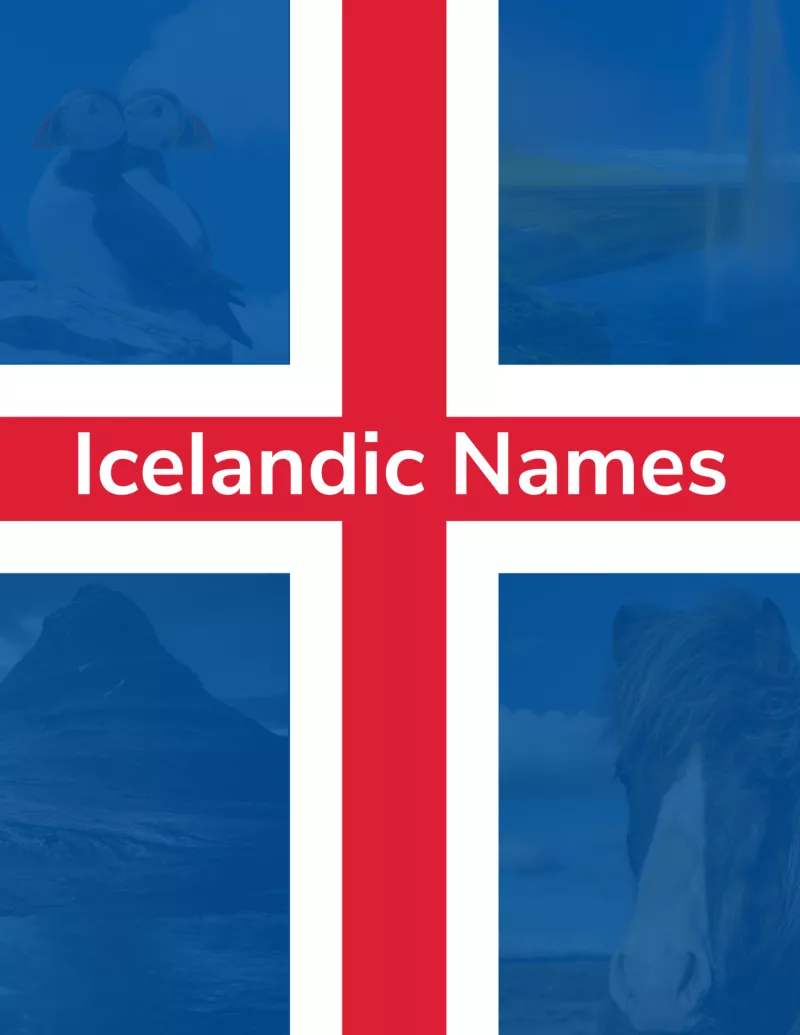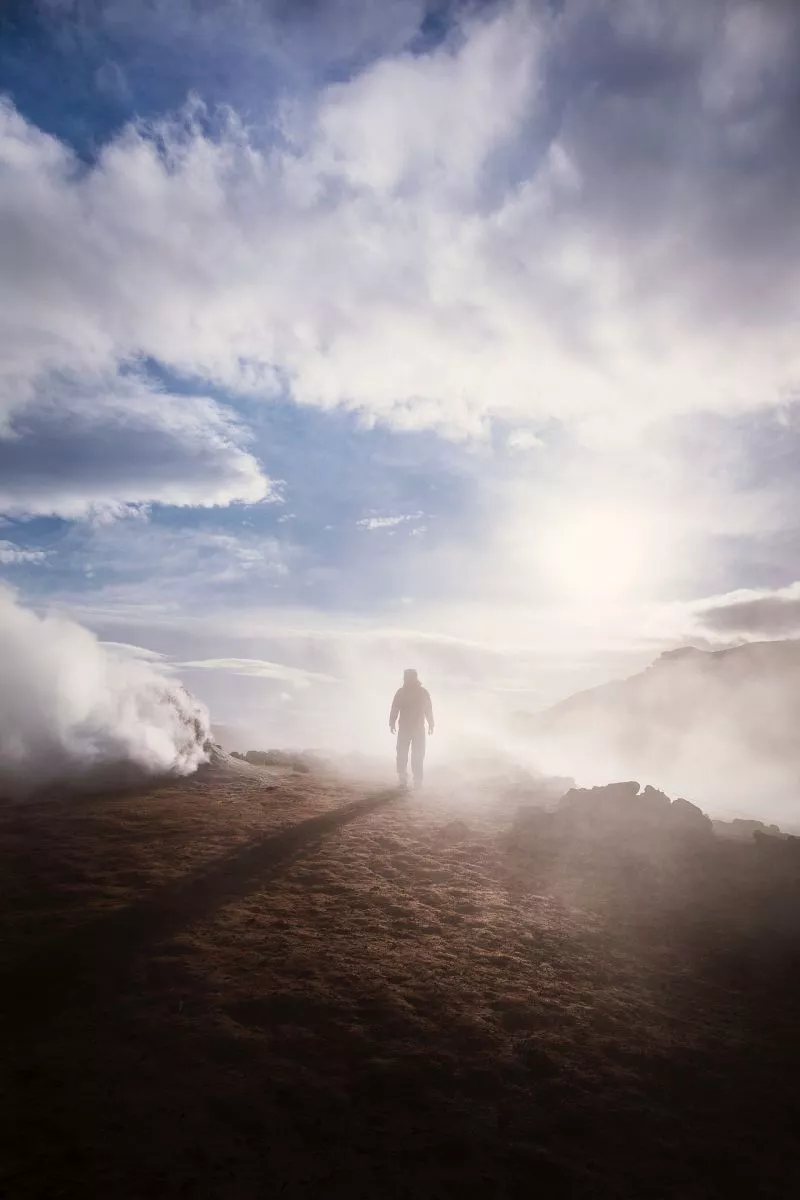Icelandic Names | The Complete Guide
We often get asked about Icelandic names.
To anyone outside of Iceland, they seem challenging to pronounce, and family trees look disjointed due to the lack of common surnames.
But in reality, the Icelandic naming system is quite simple.
Iceland uses a unique naming system, rarely used in other countries.
As well as this, Icelanders are only allowed to be called names that have been approved by an official body, called the Icelandic Naming Committee.
They'll happily reject any names that aren't deemed to be Icelandic enough.
If you're already feeling a bit confused - don't worry. In this guide, we're going to explain everything you need to know about Icelandic names in plain English.
Without further ado, let's jump into the article.

Use the Quick Navigation below to go straight to the section you're interested in!
What are the most common Icelandic names?
The Icelandic Naming Committee has relatively strict rules around naming, and you can't name your child anything you want. They maintain the Personal Names Register, which lists all approved Icelandic names.
Despite nearly all Icelandic names looking quite unique from the outside, there are still quite a few of us with the same or similar first names!
It's easy to keep track of the most common Icelandic names as the database numbers are available to the public and updated each year to reflect the current numbers.
Most Common Icelandic Male Names
As of January 1st, 2019, here are the top 10 most common Icelandic male names. The number in parentheses indicates the number of Icelanders who currently go by the first name in question.
- Jón (5,177)
- Sigurður (4,187)
- Guðmundur (3,927)
- Gunnar (3,130)
- Ólafur/ Olav (2,776)
- Einar (2,443)
- Kristján (2,436)
- Magnús (2,325)
- Stefán (2,243)
- Jóhann (2,040)
Jón is by far the most popular Icelandic male name and has been for a while now.

Most Common Icelandic Female Names
Now, here are the top 10 most popular Icelandic female names according to Statice.is, with the total number of Icelanders called each name in brackets. This list was last updated on January 1st, 2019.
- Gudrún (4,656)
- Anna (4,654)
- Kristín (3,487)
- Sigríður (3,343)
- Margrét (2,886)
- Helga (2,713)
- Sigrún (2,532)
- Ingibjörg (2,136)
- María (1,962)
- Jóhanna (1,915)
As you can see, Gudrún and Anna are the two most popular names for women in Iceland by a relatively long way.
Which Icelandic Names are the Oldest?
As you would expect, some of the Icelandic names you'll come across have their roots in Ancient history.
Some have their origins in Old Norse and mythology. You still see people with these names today.
Examples of old Icelandic names include:
- Auður (female, 1100 people have this as their first name)
- Hallveig (female, 44 people have this as their first name)
- Ingólfur (male, 532 people have this as their first name)
- Björn (male 1715 people have this as their first name)
Many other names come from Old Norse, which was a North Germanic language spoken from around the 9th to the 13th centuries.
A few Icelandic names with origins in Old Norse include:
- Álfdís (female, 14 people have this as their first name)
- Ragna, female, 403 have this as their first name)
- Aðalsteinn (male, 430 people have this as their first name)
- Snævarr (male, 3 people have this as their first name)
You can discover more names with their origins in Old Norse here.
Despite these old names still appearing, it's interesting to note that most of these don't have genuinely Icelandic roots. The original settlers came from Scandinavia, and therefore their names became common throughout Iceland.
As Christianity grew in Iceland, new names arrived too. If you see a name beginning with Krist-, then it has roots in Christianity.
How do you pronounce Icelandic Names?
One of the most challenging parts of meeting someone from Iceland is ensuring you pronounce their name correctly.
However, it doesn't have to be hard. The Icelandic language has the same Germanic origins as the English language, so much of the pronunciation is the same.
As you will have noticed, there are, however, many letters that contain accents or umlauts (the double dots and commas above a, o, and u), so you should be aware of how these alter the sound of the name.
There are a few rules you can learn, and once you've memorized them, you can apply them to all Icelandic names.
A few important rules include:
Á - said as “ow” as in cow
Ð ð - said as “th” in the
E - said as "ai" in air
É - said as "yeah", but very short
F - at the start of words and between vowels, it is is said the same as the English f. Before "l" or "n" as a "b".
I - said as “I” in win
Í - said as “e” in we
O - said like the “o” in not
Ó - said as “oh”
If you want to learn more about pronouncing Icelandic names, you can check out this useful resource by ielanguages.
How are Icelandic Names Approved?
As I mentioned above, if you have a child in Iceland, you can't just name them anything.
The Icelandic Naming Committee maintains an up-to-date list of approved names, and anything that's not on there has to be reviewed by the naming committee before you're allowed to give the name to your child. Parents have to complete a form and officially request it. If the new name is approved, it will be added to the Personal Names Register and be available to use for others in the future.
The Personal Names Register is available to the public. You should be able to quickly find the list of names, or check if your name would be approved by the Icelandic Naming Committee.
Another way to have a name approved by the Icelandic Naming Committee is to prove that it can be found in Icelandic literature, no matter how old it is.
Another unique part of the Icelandic naming system is that parents are given 6 months to name their child. If you haven't chosen a name for your child within 6 months, you'll receive a fine!
Names rejected by the Icelandic Naming Committee
If you want to see how strict the Icelandic Naming Committee is, you're in luck. The names register is kept updated with all names that are rejected.
Common American or English names are generally quickly rejected, and these include names like Ben, Chris, Eliza, Frida, Naomi, and Rebecca.
But, why are specific names rejected by the naming committee?
When a name is submitted, it gets considered in regards to how compatible it is with Icelandic tradition, and whether or not it will cause the bearer an embarrassment. Names must also be consistent with Icelandic grammar, and only include letters that are included in the Icelandic alphabet.
If you're thinking of naming your Icelandic child something unusual, you may need to think twice!
Controversies with the Icelandic Naming Committee
With so many names being rejected, there have undoubtedly been controversies.
Blær Bjarkardóttir (January 2013)
One of the most famous cases that led to the naming committee becoming more lenient in their naming rules was the case of a girl named Blær Bjarkardóttir.
Blær is a masculine noun in Iceland. However, Blær's mother heard the name after reading an Icelandic novel that had a character named Blær (which means "gentle breeze" in Icelandic) and wanted to name her daughter after the female character with the same name.
Initially, the naming committee rejected the name (and Blær was referred to only as "Girl" in official communications) due to it being a masculine noun.
But, in January 2013, a court eventually ruled that because of the name's appearance in literature, and Blær having no issues with it, would be allowed to keep her name officially.
Since then, the naming committee has begun to be more lenient, and given are no longer restricted by gender.
Duncan and Harriet Cardew (June 2016)
Duncan and Harriet Cardew are half-Icelandic, half-British children. Their parents named them what would be common names in many English speaking countries.
However, the Icelandic Naming Committee rejected the names as they weren't sufficiently Icelandic.
Officially, the children were called Drengur (boy) and Stúlka (girl), but when the time came to renew Harriet's passport in 2014, the naming committee said they needed an Icelandic legal name.
The family had to apply for a British emergency passport, while also lodging a complaint against the naming committee's rejection.
Finally, in June 2016, the naming committee accepted the Cardew's complaint, and Duncan and Harriet were able to keep their names on their Icelandic documents.
How do Icelandic Surnames Work?
Another common question asked about Icelandic names is how surnames work.
If you look at the names of server Icelanders, you'll quickly notice that all surnames end in either "-dóttir", "-son", or "-bur".
Rather than simply taking the same surname as their parents, Iceland uses a patronymic or matronymic system.
What exactly does that mean?
Well, a child's last name will be taken from the mother or father's first name, and depending on their gender, have either "-dottir", "-son", or "-bur" added at the end of it.
For example, if a father's first name is Ólafur, and he has a daughter, her surname will be Ólafurdottir (Ólafur + dottir) as it indicates she is his daughter. If he has a son, he would be called Ólafurson (Ólafur + son). If the child was officially registered as being neutral, then their surname would be Ólafurbur (Ólafur + bur).
There are still relatively few Icelanders whose surnames end in "bur", as this was only approved in 2019 when the naming committee decided that there should be a gender-neutral option.
It should also be noted that the parents can't choose this on birth, rather individuals have to register as gender-neutral before being allowed to end their surname with bur officially.
So, as you can see, Icelandic surnames are actually very simple to understand.
Why do Icelandic names end in "-dottir"?
Icelandic names end in "dottir" because it indicates their gender, and translates to "daughter of". Female surnames always end in "dottir".
Why do Icelandic names end in "-son"?
As we've seen above, Icelandic surnames take their endings from the person's gender. All male surnames will end with son, as it indicates their gender, translating as "son of".
Should You Call Icelanders By Their First or Last Names?
In Iceland, unlike other countries, you formally address people by their first name. If you meet someone new, no matter their level of authority, they'll usually introduce themselves by their first name.
Directories with lists of people are organized by first name, rather than by surname.
However, when Icelanders move abroad, it's common for them to adopt the naming system of their local destination, and it's likely they would use their surname more often. For example, a football player in an international league would have their surname on their shirt, rather than their first name.
Wrapping Up
As you can see, Icelandic names aren't that complicated.
We have a simple naming system, and the rules around surnames are straightforward once you understand them.
The Icelandic Naming Committee may seem like an outdated body, but it's slowly becoming more lenient, and Icelanders are being given more freedom to name their children, or themselves, the name they want without as much fear of it being rejected.